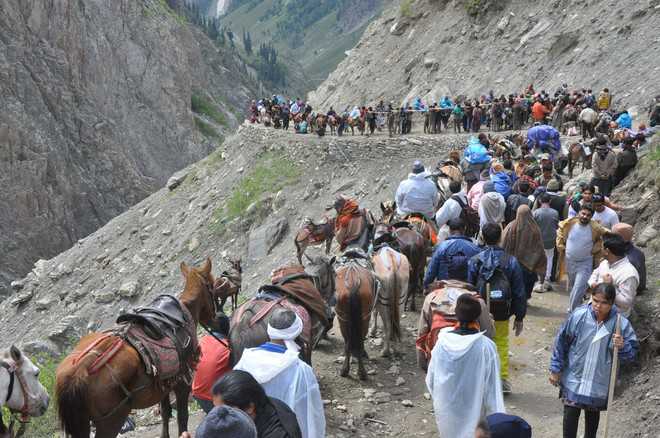Where Divinity Meets the Mountains
In the heart of the mighty Himalayas, nestled among the snow-capped ridges and lush green valleys of Jammu & Kashmir, lies one of the most sacred sites in Hinduism—the Amarnath Cave Shrine. Here, each year during the summer months, thousands upon thousands of devotees undertake a pilgrimage to behold the naturally formed ice Shivlingam, a rare symbol of divinity that appears only during a particular time of the year. The Amarnath Yatra is not merely a journey of physical endurance—it is a spiritual calling, a celebration of faith, sacrifice, and human unity.
As a native of this sacred land, I extend my heartfelt welcome and deepest salutations to every yatree (pilgrim) who sets foot on our soil in search of divine blessings. I pray to Allah Almighty to protect you, grant health and bless your journey with peace and fulfillment. May more and more yatris continue to arrive, and may your presence continue to grace our region with an atmosphere of brotherhood, peace, and mutual respect.
Origins: Myths, Legends, and Ancient Reverence
The Amarnath Cave, situated at an altitude of approximately 3,888 meters (12,756 feet), has long been revered as one of the holiest pilgrimage sites in India. It is said that Lord Shiva chose this remote and awe-inspiring location to reveal to Goddess Parvati the secret of immortality—the Amar Katha. To ensure absolute secrecy, he abandoned all material possessions, symbolic companions, and cosmic forces at various stages along the route.
The legend continues that Shiva left behind the moon at Chandanwari, his snakes at Sheshnag, his son at Mahagunas top, and even the five elements at Panchtarni, before entering the cave to divulge the sacred secret. This is why each waypoint on the yatra is considered spiritually significant.
The cave and the naturally formed ice stalagmite, which resembles a lingam, are seen as a divine manifestation of Shiva. Its waxing and waning cycle, which follows the lunar calendar, is viewed as a celestial affirmation of faith. The pilgrimage is believed to be more than 5,000 years old, with references found in ancient scriptures and local traditions.
Though many saints and yogis visited the cave through the centuries, its modern rediscovery is attributed to a Gujjar shepherd named Buta Malik in the 19th century. The story goes that a saint gave him a pouch of coal that turned to gold, prompting him to search for the saint, only to find the cave instead. Since then, the Gujjar community has remained intricately connected to the Yatra.
The Yatra Routes: Where the Earth Meets the Divine
The Amarnath Yatra begins each year during Shravan month (July–August) and follows two principal routes:
The Pahalgam Route (46 km): Considered the traditional path, this longer but scenic route follows in Lord Shiva’s footsteps. Pilgrims pass through Chandanwari, Sheshnag, Mahagunas Pass, and Panchtarni before reaching the cave. It is physically challenging but deeply rewarding for those who undertake it.
The Baltal Route (14 km): Shorter and steeper, this route is popular among pilgrims seeking a quicker ascent. Though more taxing due to its sharp gradients, it offers stunning views and direct access to the shrine.
Every step on these trails is both a physical feat and a spiritual meditation. The terrain may be rugged and the climate unpredictable, but yatris walk with resolve, often chanting “Bam Bam Bhole” as the snow-lined peaks echo their devotion.
A Tapestry of Faith and Fraternity
One of the most moving aspects of the Amarnath Yatra is the communal harmony that surrounds it. While the pilgrimage is rooted in Hindu tradition, Muslim, Sikh, and Christian residents of Kashmir also play vital roles in facilitating the journey. From Muslim pony handlers, porters, shopkeepers, and tent operators, to Sikh langar volunteers and local Christian service workers, the Yatra becomes a festival of shared humanity.
Every year, hundreds of Langars (community kitchens) are set up along the route, offering free food, water, and even medical help to yatris. Volunteers from all over India, irrespective of religion, serve meals, carry luggage, and offer emotional support to strangers on a sacred path. This coming together of communities is a beacon of unity, defying divisive narratives and reaffirming the inclusive spirit of Kashmir.
Security, Seva, and the Strength of Systems
Ensuring the smooth and safe conduct of such a massive pilgrimage is a logistical and administrative feat. The Shri Amarnath Shrine Board (SASB), in coordination with the Indian Army, J&K Police, CRPF, ITBP, and civil administration, implements a multi-layered security and health safety net.
RFID tracking, satellite surveillance, oxygen booths, and disaster response teams are deployed along the routes. Helicopter services are provided for senior citizens and those unable to trek. From Pony routes and rest shelters to mobile clinics and weather-monitoring posts, every detail is accounted for to make the Yatra safer, especially in the face of challenging terrain and volatile weather conditions.
Yet at the heart of this intricate web lies seva—the spirit of selfless service. It’s this intangible force that elevates the journey from a trek to a transformation
Economic Pulse of the Region
The Yatra is not only sacred—it is also economically vital. For many families living in remote parts of Kashmir, this is the most important season of the year. Transporters, shopkeepers, artisans, hoteliers, and porters find much-needed employment and income. According to some estimates, the Yatra contributes hundreds of crores annually to the local economy.
Additionally, infrastructure development—improved roads, better emergency care, enhanced sanitation facilities—often coincides with the Yatra season, leaving lasting benefits for the local population. The pilgrimage thus becomes a catalyst for sustainable rural development in regions otherwise neglected for most of the year.
A Message to the Pilgrims: My Salute and My Prayer
Dear yatris, as you walk through our mountains, breathe our air, and bow before the divine ice lingam, please know that you are not alone. You are cherished guests, and we, the people of Kashmir—regardless of our faith—are proud to host you. We salute your devotion and share in your joy.
May your footsteps continue to grace our soil. May your prayers bring peace not only to your hearts but also to our hills. And may the eternal spirit of Amarnath continue to unite hearts across boundaries and beliefs.
Har Har Mahadev! Jai Bhole Nath!
The writer is a Kashmir-based writer and newspaper columnist who writes on land reform, rural governance, and cultural heritage in Jammu & Kashmir.



